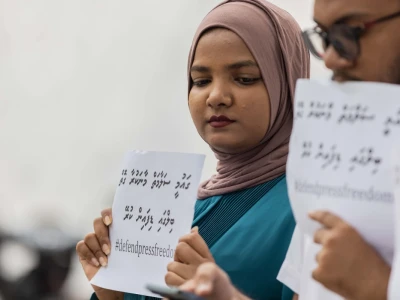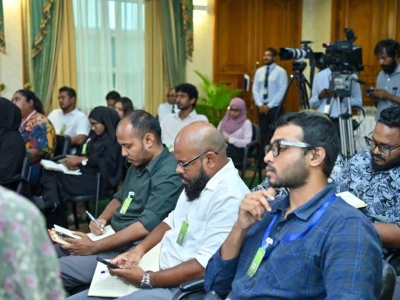
Media bodies propose amendments to Evidence Act
Maldives Journalist Association (MJA) and Maldives Editors Guild (MEG) have opened their draft amendments for public opinion.
Top Stories
By
Mohamed Muzayyin Nazim
Maldives Editors Guild (MEG) and Maldives Journalists Association (MJA) on Saturday opened for public opinion a series of amendments the organisations plan to propose for the new Evidence Act.
President Ibrahim Mohamed Solih ratified amendments to the Evidence Act on 20 July, allowing courts to demand the disclosure of journalists’ sources.
The amendment of the Evidence Act was ratified amid protests from local and international media rights organisations. To be enforced from 20 January 2023, the government has assured journalists that their concerns would be addressed regarding this Act.
Article 136 uses broad terms such as “acts of terrorism” and “national security related crimes” as instances where journalists can be compelled to disclose their sources.
The Prosecutor General (PG) and the suspect in the case, both have freedom to request for the journalist’s source at the courts.
The law does not specify which court can authorise this information breach in a journalists’ profession.
Government ignored a comprehensive document listing concerns and recommendations which was provided to the parliament by MJA and the Maldives Media Council (MMC).
The amendments MJA and MEG included in the draft they prepared are very specific regarding the conditions and situations that should force journalists to reveal their sources. The draft also specified that only the High Court of Maldives can issue a court order to reveal sources.
The draft specifies crimes that might allow a journalist to reveal their sources by court order:
-
A violent crime where the injury caused is severe.
-
A third party’s life is directly threatened apart from the suspect).
-
Kidnapping or hostage situation.
-
Extreme loss to property or wealth of an individual.
-
Hijacking of a vessel/vehicle/aircraft and/or passengers.
-
A situation that threatens the safety and health of the public.
-
Immense destruction to public property or disruption to utility facilities.
The other important point in the draft is a list of factors that should be considered by the High Court before enforcing source disclosure:
-
To ascertain if it is absolutely necessary to reveal the source.
-
To ascertain if there are other ways of reaching the heart of the matter through an immaculate investigation.
-
Consider the adverse effects of infringing on the rights guaranteed for journalists in the Maldivian Constitution.
-
Consider the effects of not revealing the source as well.
MJA also noted that President Solih ignored a petition by 158 fellow Maldivian journalists calling on him to refuse to ratify the bill.
In global context, Reporters Without Borders (RSF) has joined nine other human rights organisations in calling on the government of the Maldives to repeal or amend a provision forcing journalists to reveal their sources. The nine other organisations are:
-
Amnesty International
-
Centre for Law and Democracy
-
CIVICUS: World Alliance for Citizen Participation
-
Committee to Protect Journalists
-
Human Rights Watch
-
International Federation of Journalists
-
Maldives Journalist Association
-
Maldives Editors Guild
-
Transparency Maldives
“After Maldives’ 15th-place fall in RSF’s 2022 World Press Freedom Index, Maldivian democracy is at a crossroads. -As it stands, section 136 of the Evidence Act opens the way to the worst authoritarian abuses. At the same time, respect for the confidentiality of sources is an indispensable, non-negotiable condition for the free exercise of journalism as a 'fourth estate' and guarantor of the democratic system," said Daniel Bastard, RSF's Asia-Pacific Director.




